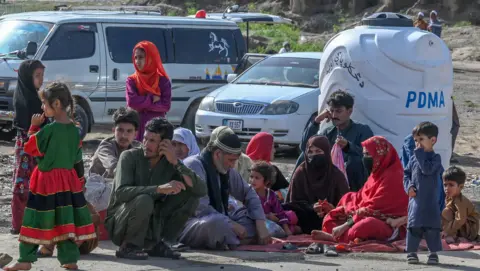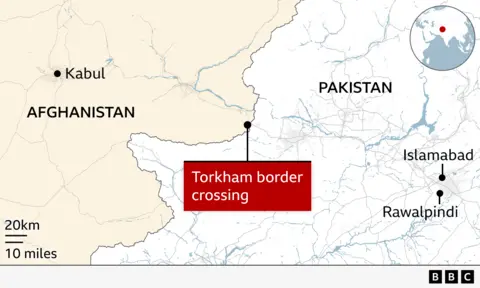Pakistan expels tens of thousands of Afghans
BBC World Service
 Getty Images
Getty ImagesPakistan has deported more than 19,500 Afghans this month, among more than 80,000 who have left ahead of a 30 April deadline, according to the UN.
Pakistan has accelerated its drive to expel undocumented Afghans and those who had temporary permission to stay, saying it can no longer cope.
Between 700 and 800 families are being deported daily, Taliban officials say, with up to two million people expected to follow in the coming months.
Pakistani Foreign Minister Ishaq Dar flew to Kabul on Saturday for talks with Taliban officials. His counterpart Amir Khan Muttaqi expressed “deep concern” about deportations.
Some expelled Afghans at the border said they had been born in Pakistan after their families fled conflict.
More than 3.5 million Afghans have been living in Pakistan, according to the UN’s refugee agency, including around 700,000 people who came after the Taliban takeover in 2021. The UN estimates that half are undocumented.
Pakistan has taken in Afghans through decades of war, but the government says the high number of refugees now poses risks to national security and causes pressure on public services.
There has been a recent spike in border clashes between the security forces of both sides. Pakistan blames them on militants based in Afghanistan, which the Taliban deny.
Pakistan’s foreign ministry said the two sides had “discussed all issues of mutual interest” in Saturday’s meeting in Kabul.
Pakistan had extended a deadline for undocumented Afghans to leave the country by a month, to 30 April.
On the Torkham border crossing, some expelled Afghans told the BBC they left Afghanistan decades ago – or had never lived there.
“I lived my whole life in Pakistan,” said Sayed Rahman, a second-generation refugee born and raised in Pakistan. “I got married there. What am I supposed to do now?”
Saleh, a father of three daughters, worried what life under Taliban rule will mean for them. His daughters attended school in Pakistan’s Punjab province, but in Afghanistan, girls over the age of 12 are barred from doing so.
“I want my children to study. I don’t want their years in school to go to waste,” he said. “Everyone has the right to an education.”
Another man told the BBC: “Our children have never seen Afghanistan and even I don’t know what it looks like anymore. It might take us a year or more to settle in and find work. We feel helpless.”
At the border, men and women pass through separate gates, under the watch of armed Pakistani and Afghan guards. Some of those returning were elderly – one man was carried across on a stretcher, another in a bed.
Military trucks shuttled families from the border to temporary shelters. Those originally from distant provinces stay there for several days, waiting for transport to their home regions.
Families clustered under canvases to escape the 30C degree heat, as swirling dust caught in the eyes and mouth. Resources are stretched and fierce arguments often break out over access to shelter.
Returnees receive between 4,000 and 10,000 Afghanis (£41 to £104) from the Kabul authorities, according to Hedayatullah Yad Shinwari, a member of the camp’s Taliban-appointed finance committee.
The mass deportation is placing significant pressure on Afghanistan’s fragile infrastructure, with an economy in crisis and a population nearing 45 million people.
“We have resolved most issues, but the arrival of people in such large numbers naturally brings difficulties,” said Bakht Jamal Gohar, the Taliban’s head of refugee affairs at the crossing. “These people left decades ago and left all their belongings behind. Some of their homes were destroyed during 20 years of war.”
Nearly every family told the BBC that Pakistani border guards restricted what they could bring – a complaint echoed by some human rights groups.
Chaudhry said in response that Pakistan did “not have any policy that prevents Afghan refugees from taking their household items with them”.
One man, sitting on the roadside in the blistering sun, said his children had begged to stay in Pakistan, the country where they were born. They had been given temporary residency, but that expired in March.
“Now we’ll never go back. Not after how we were treated,” he said.
Additional reporting by Daniel Wittenberg and Mallory Moench





